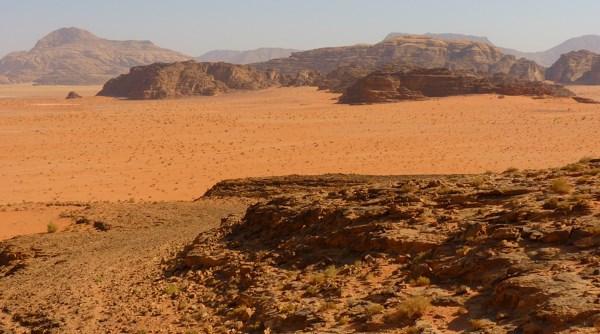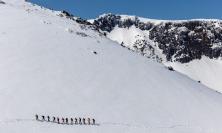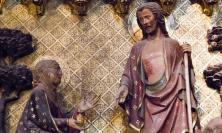Thinking Faith’s Lenten reflections this year will take us into the desert, as we look at how and why it is so often a place of encounter with God and of transformation. James Hanvey SJ introduces the desert as a living memory within the Christian tradition – what does it mean to be people of the desert, and why might there be a heightened awareness of that during Lent?
Some years ago, I had the opportunity to visit the Negev while on a pilgrimage to Jerusalem. I was completely unprepared for its severe beauty and grandeur, which touched the soul as well as the body. I also realised that far from being a place of sterility, the desert was alive: not just because it contained life in so many different forms, but it was somehow itself alive. Such an environment does not make many concessions to human needs and living there must be as precarious as the shifting sand itself. Yet, somehow it has the power to call; to offer some sort of hard freedom, learning to live on the edge of survival in vastness that cannot be secured or controlled. The desert is an environment that haunts us and manages to inhabit our inner space as much as it defines a place. In its own way, the desert forces us to be nomads, for the only way to live there is to journey, making use of the sparse resources without exhausting or destroying them. These landscapes cannot be shaped by our hands to fit some image in our mind; they sculpt us as their sands, now still, now driven, mould us into forms the desert itself prefers. The demands the desert makes upon all its nomadic inhabitants soon erode any romantic illusions and teach us the preciousness, the simplicity, the fragility and resilience of life.
One cannot be a Christian without the desert entering into one’s life in some way. It is integral to the Old Testament and the very way in which Israel comes to know itself and its God. The desert is not only a physical presence, it becomes the locus of knowledge and encounter. Above all, it is experienced as a place of purification when Israel not only repents of its idolatry but experiences the desert pedagogy of God’s loving mercy. In the symbolic 40 years in which it wanders in the desert, Israel comes to experience God’s hesed, God’s loving care that provides water and food. The nation comes to know in a way that goes beyond codes and rituals that it truly is God’s people – this God, a living god, who is Lord of the desert and of history. Israel learns that it is only this God who can be trusted, and so grows in loving, faithful dependence. Out of the desert comes purification, knowledge and, above all, freedom. In the desert, Israel comes to know God in a new way, by living the covenant which the law itself cannot fully express or contain. In the desert, Israel’s journey of repentance is uncovered as a journey of love, a journey of lived holiness. The solitude is not emptiness but consecration, and the wandering not a lostness but a path of faith. In a different key and in a different way, the desert is a new theophany without which the covenant of Sinai would have been broken and impossible to regain. For Israel, the desert is a place of renewal, not only through the rediscovery of God’s power and majesty but through the realisation of the greater glory of God’s merciful loving faithfulness. Even when the physical journey ceases in the new land of promise, the inner journey always remains because we can never be done with the need of forgiveness and the wisdom of the desert. The experience is inscribed upon Israel’s heart and in its memory, which becomes a well of hope and vision against destruction and despair. The prophets renew it, for they recover this desert time as a time of love; it is even echoed in the Song of Songs.
The memory is present right at the beginning of Jesus’s ministry. The Spirit ‘drives’ him into the desert. This is more than some symbolic recapitulation of a narrative memory: it is Jesus’s time of consecration. Here, too, he experiences the desert as a place of encounter with the illusions and temptations of evil, and the loving providence of God’s creation. Each of the temptations represent some alternative way of accomplishing the messianic vision. Each way is rejected as false because it is either a subtle test of God or a rejection of God. Underneath the serpentine wisdom of the tempter is the lure of blasphemy, for the temptations are all centred on the glorification of the ‘I’, not on service of God. Jesus does not engage in any debate or exegetical point scoring but in each case asserts the absolute sovereignty God and his dependence upon God alone. It is a magisterial demonstration of true sonship and fidelity, which already prefigures Gethsemane. It is in the desert that the gospels first introduce us to the profound struggle with evil that lies at the heart of Jesus’s mission. In the desert, we see evil unmasked and defeated, and so we are quietly taught that in all our desert struggles we have nothing to fear if we remain truly in God’s hands.
The great eremitical tradition of the Church, whether it is in the movement of Desert Fathers or in the later seclusion of the contemplative life, was never a flight from the world but a journey for the world. There, in the desert, is the place of encounter; to learn again not only the deceptions of evil – personal, social and cosmic – but to experience the presence of God and to glorify the divine work of redemption. Far from being a place of sterility and death, the desert is discovered as the place of renewal and strength; the place, interior as well as exterior, where we can begin again and return to bring life to the world.
This memory of the desert comes to the fore during the season of Lent, a time of renewal in which we can come to unclutter our lives and learn to live simply in loving dependence upon the Father. It is a time when the Spirit can lead us, bringing us to a deeper freedom and generosity of service, showing us how to be sources of life in the great man-made deserts of our society. The desert is also a moment of renewal of our covenant with creation itself. We can come to see how little we really need, how our culture inflates our desires to make us consumers, yet must always keep us wanting more. The desert of Lent gives us the freedom to rest from the drivenness of the markets or the addictions to the net. In the desert of Lent, we can begin to experience the ‘shalom’ of Easter.
James Hanvey SJ is Master is Campion Hall, University of Oxford.






